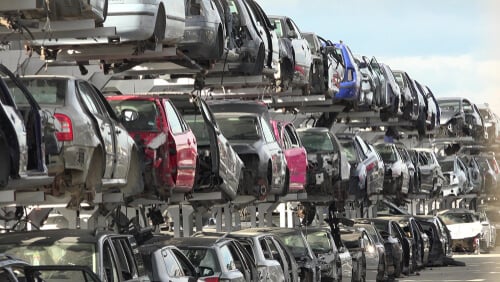
Reading Time: 4 minutes
Transporting a salvage car can seem daunting, but with the right approach, it becomes straightforward. Whether you’ve acquired a vehicle from an insurance auction or are relocating a damaged car, understanding the nuances of salvage car shipping is crucial.
In 2025, advancements in auto transport services have made salvage car shipping more efficient and reliable than ever. This guide will walk you through the steps for your salvaged vehicle to reach its destination–safely and without hassle.
Did you take the plunge and bought a salvaged car from a police or insurance auto auction? Every more than half a million cars are written off by insurance companies. These are the cars that are sold at salvage car auctions. Unfortunately, when it comes to bringing the car home, most people are in for a big surprise. We’d like to help you avoid unnecessary inconvenience, so please read this post in its entirety.
Shipping a Salvage Car
Insurance companies often apply salvage titles to cars that they consider too expensive to repair, so the repair costs exceed the value of the car. They will pay the owner the pre-accident value of the car, which, from then, is the insurer’s property, while the remnants of the car are sold at an insurance auto auction. Police auctions, on the other hand, often include cars in perfect condition that were recovered after being stolen or used in crimes. Because the vehicle owner would have been paid for the vehicle by the insurance, these cars also land up on the salvage yards, offering the perfect opportunity for people who want decent cars at unbeatable deals. While many salvaged cars are badly damaged, there are obviously many that are drivable.
Note: We do not recommend buying a salvage car as your first car!
You may not drive on American roads in a vehicle that has a salvage or scrap title. It has to be repaired first and re-registered. Therefore, you will have to have the car towed or shipped from the salvage yard to your home or workshop. With that in mind, pay close attention to the facts contained in this post.
For comprehensive information on the legalities and safety requirements of shipping a salvage car, consult the National Highway Traffic Safety Administration for the latest guidelines.

Your Shipping Options
There are many ways to ship a vehicle, including towing it, or putting it on a car dolly. However, it is safest to use a car shipping company that specializes in shipping cars with salvage titles. In most cases, you will be able to choose from the following options:
- Open car carrier
- Enclosed auto shipping
- Door-to-door shipping
- Terminal to terminal auto transport
How to ship a car from the insurance auctions
Shipping a car from insurance auctions involves a few important steps. Here’s how to do it in a simple and straightforward way:
- Settle All Auction Fees: Before picking up your car, make sure to clear all payments with the auction house. This includes settling any storage, membership, and overdue fees. Remember, the auction won’t release your car until they confirm all payments.
- Watch Out for Storage Fees: Auctions usually offer a couple of days of free storage after your purchase. To avoid extra charges, coordinate with your transporter to pick up the car within this free period.
- Communicate Clearly with Your Transporter: It’s crucial to inform your vehicle carrier about the car’s condition, especially if it’s a salvage that can’t steer or roll due to damage. This ensures they bring the right equipment for loading and unloading. Don’t forget to give them your buyer number, the car’s VIN, and lot number for a hassle-free pickup.
Follow these tips to get your car from the auction to its destination without any hitches.
Be Prepared for Auto Shipping
- Keep a close eye on the keys when you pick up your auction car; they’re usually attached with zip ties to the wheel. Remember the number of keys you receive. Auctions often won’t take the blame if keys go missing — theft does happen.
- Expect the use of forklifts at auto auctions. Places like IAAI and Copart regularly use them for loading cars onto trailers. This could risk your car’s underside, and auctions typically won’t cover any damage here. If your car’s in a condition to roll and the auction allows, our team prefers to use a winch for loading. It’s safer. Always double-check with the auction’s policies to avoid damage during transit.
Discover more about the environmental benefits and best practices for recycling automotive parts. Visit the Automotive Recyclers Association website, a valuable resource for eco-friendly car shipping solutions.

How much does it cost to ship a vehicle with a scrapped title?
Shipping a vehicle with a salvage title costs more because of the specialized equipment and handling required. As of 2025, the average cost to ship a standard car under 1,000 miles is approximately $600, with longer distances averaging between $1,000 and $1,500. This is depending on factors like transport type and distance.
For salvage cars, especially non-operational ones, additional fees are common. Typically, an extra charge of around $100 is added to accommodate the special equipment needed for loading and unloading these vehicles.
When selecting a company to ship a salvage car, check that they have the necessary capabilities to handle non-operable vehicles. They should own the appropriate equipment for safe loading and unloading at both pickup and delivery points. This is particularly important if the vehicle cannot roll, brake, or steer due to extensive damage.
Nationwide Auto Transportation specializes in handling such shipments, including auction-to-dealer and auto auction transports. You can request a quote or contact them directly for personalized service. We make sure that your specific needs for salvage car transport are met.



